Author Archives: Yona Zeldis McDonough
August 15, 2018 by Yona Zeldis McDonough
The Book That Teaches Children About a Jewish Prima Ballerina
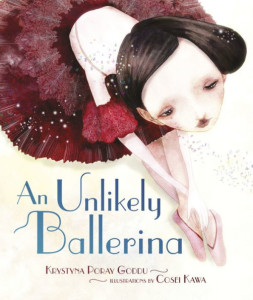
Young Lily Marks loves to stand on her tiptoes. When her parents notice there’s weakness in her legs, her doctor suggests dancing lessons to strengthen them, and Lily falls in love with ballet. But can this fragile girl ever become a serious dancer? When the famous ballerina Anna Pavlova comes to town, Lily just has to meet her. Maybe Pavlova—small, delicate, and Jewish like Lily—holds the key to Lily’s future. Fiction Editor (and lifelong balletomane) Yona Zeldis McDonough talks to author Krystyna Poray Goddu about her informative and charming new picture book.
- No Comments
July 26, 2018 by Yona Zeldis McDonough
An Ode to Iris Apfel
At age 84, Iris Apfel had the distinction of being the first living person whose clothing was exhibited by the Metropolitan Museum of Art’s renowned Costume Institute. Ever since I stumbled upon the show Rara Avis: Selections from the Iris Apfel Collection at the Met in 2005, I became an ardent fan of Apfel. Walking through the galleries, I was captivated by her highly original way of mixing high-low fashion, as well as her knack for building an outfit with the depth, complexity and wit of an accomplished visual artist.
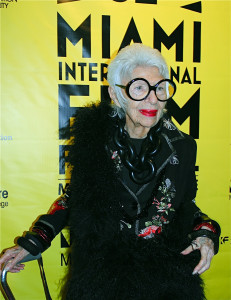 I bought the accompanying book and kept Apfel on my radar—and so did the media. There were the various sightings and snapshots by the late Bill Cunningham, a 2015 Emmy-nominated documentary by the late Albert Maysles, a costume jewelry line sold on the Home Shopping Network and a partnership with MAC Cosmetics. But it was the most recent addition to the Apfel canon, Iris Apfel: Accidental Icon—Musings of a Geriatric Starlet (HarperDesign) that made me understand her place in the tapestry (pun intended!) of Jewish history.
I bought the accompanying book and kept Apfel on my radar—and so did the media. There were the various sightings and snapshots by the late Bill Cunningham, a 2015 Emmy-nominated documentary by the late Albert Maysles, a costume jewelry line sold on the Home Shopping Network and a partnership with MAC Cosmetics. But it was the most recent addition to the Apfel canon, Iris Apfel: Accidental Icon—Musings of a Geriatric Starlet (HarperDesign) that made me understand her place in the tapestry (pun intended!) of Jewish history.
- No Comments
June 19, 2018 by Yona Zeldis McDonough
Dispatches From an Anxious Life
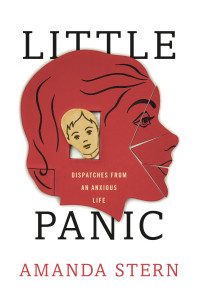 The world never made any sense to Amanda Stern–how could she trust time to keep flowing, the sun to rise, gravity to hold her feet to the ground, or even her own body to work the way it was supposed to?
The world never made any sense to Amanda Stern–how could she trust time to keep flowing, the sun to rise, gravity to hold her feet to the ground, or even her own body to work the way it was supposed to?
In her memoir Little Panic: Dispatches from an Anxious Life, Amanda describes this feeling. Deep down, she knows that there’s something horribly wrong with her, some defect that her siblings and friends don’t have to cope with.
Growing up in the 1970s and 80s in New York, Amanda experiences the magic and madness of life through the filter of unrelenting panic. Plagued with fear that her friends and family will be taken from her if she’s not watching—that her mother will die, or forget she has children and just move away—Amanda treats every parting as her last. Shuttled between a barefoot bohemian life with her mother in Greenwich Village, and a sanitized, stricter world of affluence uptown with her father, Amanda has little she can depend on. And when Etan Patz, the six-year-old boy down the block from their MacDougal Street home disappears on the first day he walks to school alone, she can’t help but believe that all her worst fears are about to come true.
- No Comments
June 12, 2018 by Yona Zeldis McDonough
Isolated Mothers, Searching for Miracles
The reader knows by page one of Queen for a Day that Mimi Slavitt’s three-year-old son is autistic, but if anyone told her, she wouldn’t listen, because she doesn’t want to know—until at last Danny’s behavior becomes so strange even she can’t ignore it. After her son’s diagnosis, Mimi finds herself in a world nearly as isolating as her son’s. Searching for miracles, begging for the help of heartless bureaucracies while arranging every minute of every day for children who can never be left alone, she and her fellow mothers exist in a state of perpetual crisis, “normal” life always just out of reach. In chapters told from Mimi’s point of view and theirs, we meet these women, each a conflicted, complex character dreaming of the day she can just walk away.
Taking its title from the 1950s reality TV show in which the contestants, housewives living lives filled with pain and suffering, competed with each other for deluxe refrigerators and sets of stainless steel silverware, Queen for a Day portrays a group of imperfect women living under enormous pressure. Maxine Rosaler talks to Fiction Editor Yona Zeldis McDonough about the true-life experiences that led her to write this book. (more…)
- No Comments
June 6, 2018 by Yona Zeldis McDonough
What Did Your Grandparents Do to Mine?
 After breaking her hip in a serious accident, Eleanor Ritter’s mother, Rose, a Holocaust survivor now living in New Jersey, suddenly starts talking about her harrowing childhood in Poland and the taboo subjects she has refused to discuss for half a century—even speaking in long-forgotten Polish. Around the same time, Eleanor learns that the parents of her nine-year-old son’s soccer teammate, Tadek, are Catholics from Poland.
After breaking her hip in a serious accident, Eleanor Ritter’s mother, Rose, a Holocaust survivor now living in New Jersey, suddenly starts talking about her harrowing childhood in Poland and the taboo subjects she has refused to discuss for half a century—even speaking in long-forgotten Polish. Around the same time, Eleanor learns that the parents of her nine-year-old son’s soccer teammate, Tadek, are Catholics from Poland.
As Eleanor becomes fixated with digging into the histories of both her mother and Tadek’s family, her obsession strains her already difficult relationship with Rose, as well as her marriage to Nick, an IT technician who is himself caught up in preparing for the feared Y2K turn of the millennium.
Eleanor starts flirting with the soccer coach, ignoring her 12-year-old daughter’s growing rebellion and her son’s misery when, messing up several games, he becomes the team pariah. Meanwhile, the “sure-fire” tech stock that Eleanor bought behind Nick’s back is losing money. Even as her quest nourishes an odd friendship with Tadek’s mother, it forces Eleanor to face the unavoidable questions: For how many generations can guilt carry on? And: What did your grandparents do to my grandparents?
Hawthorne, the author of the award-winning Ethical Chic: The Inside Story of the Companies We Think We Love and seven other books about business, consumers and social issues, talks to Fiction Editor Yona Zeldis McDonough about her journey from fiction to fact and then back again.
- No Comments
June 5, 2018 by Yona Zeldis McDonough
Love, Seduction and Survival—and Always, Paris
In 1950, Glynne Hiller, 26, goes to Paris with her husband, Joe, and her three-year-old daughter, Cathy, so they can all study French in the City of Light. But after a year, Glynne leaves Joe. She doesn’t love him—in fact, she questions whether she’s ever been in love—and she is looking for a more liberated life. Saucy and beautiful, Glynne charms one man after another, including the movie star Jean Gabin. Then she meets a man named Maurice and her whole understanding of love changes. Hiller, now 94, describes this transformation in the memoir Passport to Paris. She talks about her life and writing with Fiction Editor Yona Zeldis McDonough. 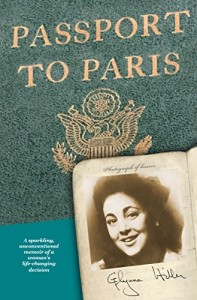
YZM: Your father, an Egyptian Jew, moved your family from England to America in 1939; did he have a sense of what was coming?
GH: My father started a cotton mill with his brother in Guatemala, before the war started. Both of my brothers volunteered to fight: Eddie, the eldest, in the RAF (Royal Air Force). Max went into the artillery force. Both survived.
Meanwhile, Sally and I, separately, came to America. I came alone, and on the second night, we all came on deck were told we mustn’t make a single sound because there was a German U-boat in the vicinity. And everybody, even the children, were absolutely mum. We all cooperated. And they were already unloading the little lifeboats boats. It was very scary, I have to tell you.
- No Comments
May 29, 2018 by Yona Zeldis McDonough
What It’s Like to Publish Your Debut Novel… at Age 90
All this week, in the grand tradition of Victorian periodicals, Lilith will be serializing an excerpt of Sadie in Love, the debut novel from 90-year-old former magazine editor Rochelle Distelheim. Look out for new installments every day this week.
Sadie in Love: Part 1| Part 2 | Part 3 | Part 4
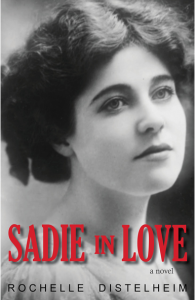
Sadie Schuster—fortyish, plumpish, a suffragist, and recently widowed—spends more time now talking to her late husband, Fivel, than she did when he was alive. Sadie keeps Fivel informed of her daily activities—especially her pursuit of a husband—because “An empty bed is a cold place for a hot-blooded woman.” A lover of ballroom dancing, the moving pictures, and night-school English words, Sadie’s true talent lies in the magic love-knots she artfully crafts for lonely, unwitting, immigrants willing to purchase hope wrapped in a schmattah for fifty cents.
Selling love-knots while seeking love, Sadie consults with her magic spirits to woo Herschel—the muscled ice peddler who reads poetry and pines for his newly departed wife. Her daughter, Yivvy, sells secondhand, possibly “pinched” tchotchkes in her antique shop and plans to marry the Irish cop on the beat. Enter Ike Tabatnik, the “Dance King of Riga, Latvia,” just off the boat and ready to take on America—and Sadie’s heartstrings. Comedy and chaos follow.
A stunning confession, following the wedding of one of her love-knot clients—which begins with one groom and ends with another—pushes Sadie to make a surprising choice. She then throws herself at the mercy of her magic spirits, asking them to do quickly for her what they have been doing for her customers—before it’s too late. Fiction Editor Yona Zeldis McDonough talks to Rochelle Distelheim about what it feels like to have her debut novel published when she’s in her nineties.
- 1 Comment
May 23, 2018 by Yona Zeldis McDonough
A Novel Imagines F. Scott Fitzgerald’s Lesser-Known (and Jewish) Love Affair
In 1937 Hollywood, gossip columnist Sheilah Graham’s star is on the rise—while literary wonder boy F. Scott Fitzgerald’s career is slowly drowning in booze. But the once-famous author, desperate to make money penning scripts for the silver screen, is charismatic enough to attract the gorgeous Miss Graham, a woman who exposes the secrets of others while carefully guarding her own. Like Fitzgerald’s hero Jay Gatsby, Graham has meticulously constructed a life far removed from the poverty of her childhood in London’s slums. And like Gatsby, the onetime guttersnipe learned early how to use her charms to become a hardworking success; she is feted and feared by both the movie studios and their luminaries.
A notorious drunk famously married to the doomed Zelda, Fitzgerald fell hard for his “Shielah” (he never learned to spell her name), who would stay with him and help revive his career until his tragic death three years later.
Working from Sheilah’s memoirs, interviews, and letters, Sally Koslow revisits their scandalous love affair and Graham’s dramatic transformation in London in her new novel, Another Side of Paradise, out this month from HarperCollins.
Koslow, the former editor-in-chief of McCall’s Magazine and author of four other novels, including acclaimed international bestseller The Late, Lamented Molly Marx, talks to Fiction Editor Yona Zeldis McDonough about how she came to uncover the secrets of Graham’s past—and why.
- 2 Comments
May 2, 2018 by Yona Zeldis McDonough
“The Heirs” Asks For How Many Generations Can Guilty Carry On?
 After breaking her hip in a serious accident, Eleanor Ritter’s mother, Rose, a Holocaust survivor now living in New Jersey, suddenly starts talking about her harrowing childhood in Poland and the taboo subjects she has refused to discuss for half a century—even speaking in long-forgotten Polish. Around the same time, Eleanor learns that the parents of her nine-year-old son’s soccer teammate, Tadek, are Catholics from Poland.
After breaking her hip in a serious accident, Eleanor Ritter’s mother, Rose, a Holocaust survivor now living in New Jersey, suddenly starts talking about her harrowing childhood in Poland and the taboo subjects she has refused to discuss for half a century—even speaking in long-forgotten Polish. Around the same time, Eleanor learns that the parents of her nine-year-old son’s soccer teammate, Tadek, are Catholics from Poland.
As Eleanor becomes fixated with digging into the histories of both her mother and Tadek’s family, her obsession strains her already difficult relationship with Rose, as well as her marriage to Nick, an IT technician who is himself caught up in preparing for the feared Y2K turn of the millennium.
Eleanor starts flirting with the soccer coach, ignoring her 12-year-old daughter’s growing rebellion and her son’s misery when, messing up several games, he becomes the team pariah. Meanwhile, the “sure-fire” tech stock that Eleanor bought behind Nick’s back is losing money. Even as her quest nourishes an odd friendship with Tadek’s mother, it forces Eleanor to face the unavoidable questions: For how many generations can guilt carry on? And: What did your grandparents do to my grandparents?
Hawthorne, the author of the award-winning Ethical Chic: The Inside Story of the Companies We Think We Love and seven other books about business, consumers and social issues, talks to Fiction Editor Yona Zeldis McDonough about her journey from fiction to fact and then back again.
- No Comments
April 19, 2018 by Yona Zeldis McDonough
The Holocaust and the Dot Com Boom Intertwine in This New Novel
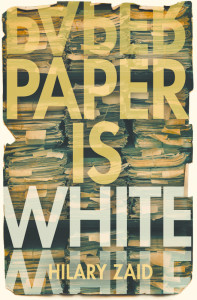 As Ellen Margolis and her fiancé Francine beat their own early path toward marriage equality, Ellen falls into a clandestine entanglement with a wily survivor of the Kaunas Ghetto and a secret search for buried history that very well may disrupt her wedding plans.
As Ellen Margolis and her fiancé Francine beat their own early path toward marriage equality, Ellen falls into a clandestine entanglement with a wily survivor of the Kaunas Ghetto and a secret search for buried history that very well may disrupt her wedding plans.
Set in ebullient, 1990s dot-com-era San Francisco, Paper Is White is a novel about the gravitational pull of the past and how it directs and transforms the present.
Zaid, whose story “Even in Dreams, She Leaves Me Every Time” appeared in the Winter 2013-2014 issue of Lilith, talks to Lilith’s Fiction Editor Yona Zeldis McDonough about her nuanced and tender debut.
- No Comments
 Please wait...
Please wait...